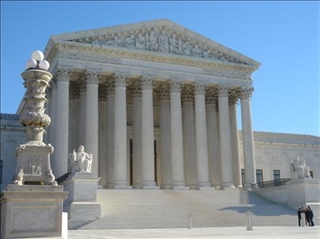
America - What a nation with quite a history. The works and labors and the personal testimonies of the men who laid the foundations upon which the events of 1776 would be laid in time. Whether in public or done in secrecy; there's a name that has generated more than the name of God.
1799 - Runkel vs. Winemiller: "'Religion is the peace and good order of government, the safety and
happiness of the people. By our form of government, the Christian religion is the established
religion; and all sects and denominations of Christians are placed upon the same equal footing."
From the supreme court in Maryland
(1)
Christianity pervaded the laws and the legal system of the States and the federal government.
For example, Judge Nathaniel Freeman in 1802 charged Massachusetts Grand Juries as follows:
"The laws of the Christian system, as embraced by the Bible, must be respected as of high authority
in all our courts... . [Our government] originating in the voluntary compact of a people who in
that very instrument profess the Christian religion, it may be considered, not as republic Rome
was a Pagan, but a Christian republic."
In 1811 ( People v Ruggles), New York Supreme Court Chief Justice James Kent held: "'...whatever
strikes at the root of Christianity tends manifestly to the dissolution of civil government... .'
We are a Christian people, and the morality of the country is deeply engrafted upon Christianity
... . Christianity in its enlarged sense, as a religion revealed and taught in the Bible, is part
and parcel of the law of the land... ." …..... '' We stand equally in need, now as formerly, of
all the moral discipline, and of those principles of virtue, which help to bind society together.
The people of this state, in common with the people of this country, profess the general doctrines
of christianity, as the rule of their faith and practice; and to scandalize the author of these
doctrines is not only, in a religious point of view, extremely impious, but, even in respect to the
obligations due to society, is a gross violation of decency and good order. Nothing could be more
offensive to the virtuous part of the community, or more injurious to the tender morals of the
young, than to declare such profanity lawful.“
(2)
The Commonwealth v Sharpless, 2 Serg & R. 91 (Sup. Ct. Penn. 1815) - ...This case will deal with
"morality." Today's oft-repeated assertion that "Morality cannot be legislated!" was not accepted
by our Founders. They believed that morality could be legislated and had found the Bible to be the
perfect example of moral legislation. Evidently no one had told God He couldn't legislate morality
--He had done so and in the opinion of our Founders, had done so quite successfully! Consequently,
when the courts made decisions concerning moral values, they relied on Biblical guidelines.......
The following cases illustrate how the courts upheld Congress' legislation of moral standards--
standards based on the Bible. The indictment delivered by the grand jury in
Commonwealth v. Sharpless describes the offense:
Jesse Sharpless ... John Haines . .. George Haines ... John Steel . . . Ephraim Martin . . . and
--- Mayo . . . designing, contriving, and intending the morals, as well of youth as of divers other
citizens of this commonwealth, to debauch and corrupt, and to raise and create in their minds
inordinate and lustful desires . . . in a certain house there . . . scandalously did exhibit and
show for money ... a certain lewd ... obscene painting, representing a man in an obscene ... and
indecent posture with a woman, to the manifest corruption and subversion of youth, and other]
citizens of this commonwealth . . . offending . . . [the] dignity of the Commonwealth of
Pennsylvania.
Here we have a classic description of a porno case, yet this one occurred in 1815! The defense
claimed that this was not an indictable offense since it was only a "home viewing," and not a
"public porno shop." The court, with Judge Duncan delivering the opinion, addressed these
arguments, stating that many things occurring in private have a public effect and are therefore
punishable: The defendants have been convicted, upon their own confession, of conduct indicative
of great moral depravity. . . . This court is ... invested with power to punish not only open
violations of decency and morality, but also whatever secretly tends to undermine the principles
of society. . .. Whatever tends to the destruction of morality, in general, may be punished
criminally. Crimes are public offenses, not because they are perpetrated publicly, but because
their effect is to injure the public. Burglary, though done in secret, is a public offense; and
secretly destroying fences is indictable. Hence, it follows, that an offense may be punishable,
if in its nature and by its example, it tends to the corruption of morals; although it be not
committed in public. The defendants are charged with exhibiting and showing . .. for money,
a lewd . . . and obscene painting. A picture tends to excite lust, as strongly as a writing; and
the showing of picture is as much a publication as the selling of a book. . . . If the privacy of
the room was a protection, all the youth of the city might be corrupted, by taking them, one by
one, into a chamber, and there inflaming their passions by the exhibition of lascivious pictures.
In the eye of the law, this would be a publication, and a most pernicious one.
The court, by referring to other laws not specifically related to this case, had noted that the
law did not allow lascivious, lewd, or obscene publications--the types of publications that are
widely distributed today. This is another example of moral legislation based on Biblical standards.
In an act unusual for that period, a second Justice, Judge Yeates, also delivered a statement:
Although every immoral act, such as lying, etc., is not indict able, yet where the offense charged
is destructive of morality in general ... it is punishable at common law. The destruction of
morality renders the power of the government invalid. . . . The corruption of the public mind,
in general, and debauching the manners of youth, in particular, by lewd and obscene pictures
exhibited to view, must necessarily be attended with the most injurious consequences.. . . No man
is permitted to corrupt the morals of the people; secret poison cannot be thus disseminated.
These rulings and opinions clash sharply with those of current courts who refuse to oppose such
materials or even to take any stands that would involve having to define "morality." When objective
standards for right and wrong are disallowed (i.e., the Bible), the. standards for morality become
variable and individually determined. By refusing to sustain standards of morality, the courts
have, by default, installed immorality as the acceptable and prevalent standard.
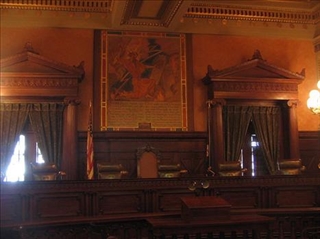
In 1824, the Pennsylvania Supreme court held ( Updegraph v The Commonwealth): Christianity,
general Christianity, is and always has been a part of the common law...not Christianity founded
on any particular religious tenets; not Christianity with an established church, but Christianity
with liberty of conscience to all men... ."
Updegraph vs The Commonwealth was an indictment for blasphemy, founded on an act of assembly,
passed in 1700, which enacts, that whosoever shall wilfully, premeditatedly, and despitefully
blaspheme, and speak loosely and profanely of Almighty God, Christ Jesus, the Holy Spirit, or the
Scriptures of Truth, and is legally convicted thereof, shall forfeit and pay the sum of ten pounds.
It charges the defendant with contriving and intending to scandalize and bring into disrepute, and
vilify the Christian Religion, and the Scriptures of Truth; and that he, in the presence and
hearing of several persons, unlawfully, wickedly, and premeditatedly, despitefully and
blasphemously, did say, among other things, in substance as follows: "That the Holy Scriptures
were a mere fable, that they were a contradiction, and that although they contained a number of
good things, yet they contained a great many lies," and the indictment concludes, to the great
dishonour of Almighty God, to the great scandal of the profession of the Christian Religion, to
the evil example of all others in like case offending, and against the form of the act of assembly
in such case made and provided.
Justice Story wrote for a unanimous Supreme Court in 1844 ( Vidal v Girard's Executors): "It is
also said, and truly, that the Christian religion is a part of the common law of Pennsylvania. But
this proposition is to be received with its appropriate qualifications, and in connection with the
bill of rights of that state, as found in its constitution of government. The Constitution of 1790
(and the like provision will, in substance, be found in the Constitution of 1776, and in the
existing Constitution of 1838), expressly declares,
"That all men have a natural and indefeasible right to worship Almighty God according to the
dictates of their own consciences; no man can of right be compelled to attend, erect, or support
any place of worship, or to maintain any ministry against his consent; no human authority can, in
any case whatever, control or interfere with the rights of conscience, and no preference shall ever
be given by law to any religious establishment or modes of worship.
"
Charleston v. Benjamin, 2 Strob. 508 (Sup.Ct. SC 1846) - "Christianity is part of the common
law of the land, with liberty of conscience to all. It has always been so recognized....
If Christianity is a part of the common law, its disturbance is punishable as common law.
The U.S. Constitution allows it as part of the common law.... The observance of Sunday is one of
the usages of the common law recognized by our U.S. and State Governments.... Christianity is part
and parcel of the common law.... Christianity has reference to the principles of right and wrong
... it is the foundation of those morals and manners upon which our society is formed; it is their
basis. Remove it and they would fall... it [morality] has grown upon the basis of Christianity."
Christianity has reference to the principles of right and wrong; It is the foundation of those
morals and manners upon which our society is formed; it is their basis. Remove this and they would
fall. Morality has grown upon the basis of Christianity..... What constitutes the standard of
good morals? Is it not Christianity? There Certainly is none other. Say that cannot be appealed to,
and what would be good morals? The day of moral virtue in which we live would, in an instant, if
that standard were abolished, lapse into the dark and murky night of pagan immorality.
"In the
Courts over which we preside, we daily acknowledge Christianity as the most solemn part of our
administration. A Christian witness, having no scruples about placing his hand upon the book, is
sworn upon the holy Evangelists -- the books of the New Testament which testify of our Savior's
birth, life, death, and resurrection; this is so common a matter that it is little thought of as
an evidence of the part which Christianity has in the common law...."
House Judiciary Committee, 1854 - Religion must be considered as the foundation on which the whole
structure rests. In this age there can be no substitute for Christianity; the great conservative
element on which we must rely for the purity and permanence of free institutions.....The great
vital and conservative element in our system is the belief of our people in the pure doctrines and
divine truths of gospel of Jesus Christ.
Commonwealth v. Nesbit, 1859 - "By our... laws against vice and immorality we do not mean to
enforce religion; we admit that to be impossible. But we do mean to protect our customs, no matter
that they may have originated in our [Christian] religion; for they are essential parts of our
social life.... Law can never become entirely infidel; for it is essentially founded on the moral
customs of men and the very generating principles of these is most often religion."
Lindenmuller v. The People, 1860 - "It would be strange for a people Christian in doctrine and
worship, many of whom or whose forefathers had sought these shores for the privilege of worshipping
God in simplicity and purity of faith, and who regarded religion as the basis of their civil
liberty and the foundation of their rights, should, in their zeal to secure to all the freedom of
conscience which they valued so highly, solemnly repudiate and put beyond the pale of the law the
religion which was dear to them as life and dethrone the God who they openly and avowedly
professed to believe had been their protector and guide as a people."
"All agreed that the
Christian religion was engrafted upon the law and entitled to protection as the basis of our
morals and the strength of our government."
Reynolds v. United States, 98 U.S. 145 (1879) - Court finds that the federal antibigamy statute
does not violate the First Amendment's guarantee of the free exercise of religion.
Davis v. Beason, 1889 -"Bigamy and polygamy are crimes by the laws of all civilized and Christian
countries. They are crimes by the laws of the United States.... To extend exemption from punishment
for such crimes would be to shock the moral judgment of the community. To call their advocacy a
tenet of religion is to offend the common sense of mankind....
Probably never before in the history
of this country has it been seriously contended that the whole punitive power of the government
for acts recognized by the general consent of the Christian world... must be suspended in order
that the tenets of a religious sect... may be carried out without hindrance."
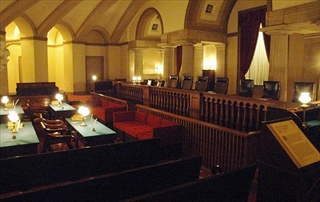
Church of the Holy Trinity v. United States,(1892) - Congress, in one of its periodic waves of
anti-immigrant delirium, passed a law placing restrictions on the ability of American firms to
hire laborers from overseas. Holy Trinity Church in New York, which had contracted with a minister
in England to be its pastor, was accused of violating the law. The Supreme Court ruled for the
church. Justice David Brewer asserted that the law was intended to apply to manual laborers, not
other types of workers. A minister, the court wrote, was a “toiler of the brain” and thus exempt
from the act. Unfortunately, Brewer did not stop there. He went off on a tangent and started
compiling evidence of the religious nature of the American people. Brewer concluded, “These, and
many other matters which might be noticed, add a volume of unofficial declarations to the mass of
organic utterances that this is a Christian nation.” Brewer’s diatribe is considered dicta, a
legal term meaning writing not directly relevant to the case. But the damage was done. Holy Trinity
has never been cited in the modern era and established no precedent in church-state relations, but
it gave ammunition to Religious Right activists who still cite it today as proof that America is a
“Christian nation.” The happiness of a people and the good order and preservation of civil
government essentially depend upon piety, religion and morality........Religion, morality, and
knowledge are necessary to good government, the preservation of liberty, and the happiness of
mankind......….Our laws and our institutions must necessarily be based upon and embody the
teachings of The Redeemer of mankind. It's impossible that it should be otherwise; and in this
sense and to this extent our civilization and our institutions are emphatically Christian...
This is a religious people. This is historically true. From the discovery of this continent to the
present hour, there is a single voice making this affirmation... we find everywhere a clear
recognition of the same truth... These, and many other matters which might be noticed,
add a volume of unofficial declarations to the mass of organic utterances that this is a Christian
nation.
"It yet remains a problem to be solved in human affairs whether any free government can be
permanent where the public worship of God, and the support of religion, constitute no part of the
policy or duty of the state in any assignable shape." Supreme Court Justice Joseph Story
The State of Tennessee v. John Thomas Scopes (1925) and commonly referred to as the Scopes Monkey Trial,
was a famous American legal case in 1925 in which a high school teacher, John Scopes, was accused
of violating Tennessee's Butler Act, which made it unlawful to teach evolution in any state-funded
school. The trial was deliberately staged in order to attract publicity to the small town of
Dayton, Tennessee, where it was held. Scopes was unsure whether he had ever actually taught
evolution, but he purposefully incriminated himself so that the case could have a defendant.
Scopes was found guilty and fined $100, but the verdict was overturned on a technicality. The
trial served its purpose of drawing intense national publicity, as national reporters flocked
to Dayton to cover the big-name lawyers who had agreed to represent each side. William Jennings
Bryan, three-time presidential candidate for the Democrats, argued for the prosecution, while
Clarence Darrow, the famed defense attorney, spoke for Scopes. The trial set modernists, who
said evolution was consistent with religion, against fundamentalists who said the word of God
as revealed in the Bible took priority over all human knowledge. The case was thus seen as both
a theological contest and a trial on the veracity of modern science regarding the creation-evolution controversy.
United States v. Macintosh, 1931
"We are a Christian people... according to one another the equal right of religious freedom and
acknowledging with reverence the duty of obedience to the will of God."
Facts of the Case:
A Canadian citizen wanted to become a naturalized U.S. citizen, but he refused to pledge to take
up arms in defense of his country. He would only fight for his country if he thought the war was
morally justified. On his citizenship application he wrote, ?I am willing to do what I judge to be
in the best interests of my country, but only in so far as I can believe that this is not going to
be against the best interests of humanity in the long run. I do not undertake to support
'my country, right or wrong' in any dispute which may arise, and I am not willing to promise
beforehand, and without knowing the cause for which my country may go to war, either that I
will or that I will not 'take up arms in defense of this country,' however 'necessary' the war
may seem to be to the Government of the day.? While he was willing to give allegiance to the
United States, he was not willing to put that ahead of his allegiance to God.
Decision:
In a 5-4 decision, the Court refused to allow a candidate for naturalization to qualify his oath
by pledging only to fight in wars he deemed moral.
Majority Opinion: (Justice Sutherland) - Naturalization is a privilege, to be given, qualified, or
withheld as Congress may determine, and which the alien may claim as of right only upon compliance
with the terms which Congress imposes.? The oath is used to gauge whether the person is fitted for
citizenship and all that it entails. While peace is a noble goal, Congress must have the power to
decide when war is necessary and select who will fight in it. This right must not be qualified or
limited. Congress, not the Courts, may decide who can claim to be a conscientious objector.
Naturalized citizens must leave this to Congress just as native born Americans do already. ?[W]e
are a nation with the duty to survive; a nation whose Constitution contemplates war as well as
peace; whose government must go forward upon the assumption, and safely can proceed upon no other,
that unqualified allegiance to the nation and submission and obedience to the laws of the land,
as well those made for war as those made for peace, are not inconsistent with the will of God. The
applicant should not be able to select the terms of his citizenship or it will become impossible
to determine which sections of the citizenship oath are nonnegotiable.
Significance:
This decision reasserted the importance of Congressional authority to dictate the terms of war.
The slippery slope argument is used to prevent any qualifications being made to the terms of
citizenship.
McCollum v. Board of Education Dist. 71, 333 U.S. 203 (1948) - Court finds religious instruction
in public schools a violation of the establishment clause and therefore unconstitutional.
Zorach v. Clausen, 1952 - "The First Amendment, however, does not say that in every and all
respects there shall be a separation of Church and State.... Otherwise the State and religion
would be aliens to each other -- hostile, suspicious, and even unfriendly....
We are a religious
people whose institutions presuppose a Supreme Being.... When the State encourages religious
instruction or cooperates with religious authorities... it follows the best of our traditions.
For it then respects the religious nature of our people and accommodates the public service to
their spiritual needs. To hold that it may not, would be to find in the Constitution a requirement
that the government show a callous indifference to religious groups. That would be preferring
those who believe in no religion over those who do believe.... [W]e find no constitutional
requirement which makes it necessary for government to be hostile to religion and to throw its
weight against efforts to widen the effective scope of religious influence.... We cannot read into
the Bill of Rights such a philosophy of hostility to religion."
Burstyn v. Wilson, 72 S. Ct. 777 (1952) - Government may not censor a motion picture because it
is offensive to religious beliefs.
In V. Watkins v. Torcaso 1961, the United States Supreme Court ruled that Secular Humanism is a
religion.
Engel v. Vitale, 370 U.S. 421 (1962).- The U.S. Supreme Court ruled that the Union Free School
District No. 9 in Hyde Park, New York had violated the First Amendment by directing the Districts'
principals to cause the following prayer to be said aloud by each class in the presence of a
teacher at the beginning of each school day. "Almighty God, we acknowledge our dependence upon
Thee, and we beg Thy blessings upon us, our
parents, our teachers and our Country."
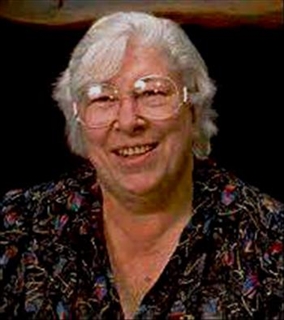
Abington School Dist. V. Schempp, 374 U.S. 203 (1963)- The U.S. Supreme Court banned school-
directed recital of the Lord's Prayer and reading of Bible passages as part of "devotional
exercises" in public
schools.
(3)
Epperson v. Arkansas, 89 S. Ct. 266 (1968)
State statue banning teaching of evolution is unconstitutional. A state cannot alter any element
in a course of study in order to promote a religious point of view. A state's attempt to hide
behind a nonreligious motivation will not be given credence unless that state can show a secular
reason as the foundation for its actions.
Lemon v. Kurtzman, 91 S. Ct. 2105 (1971)
Established the three part test for determining if an action of government violates First Amendment
's separation of church and state:
1) the government action must have a secular purpose;
2) its
primary purpose must not be to inhibit or to advance religion;
3) there must be no excessive
entanglement between government and religion.
Hendren v. Campbell- was a 1977 ruling by an Indiana state superior court that the young-earth
creationist textbook Biology: A Search For Order In Complexity, published by the Creation Research
Society and promoted through the Institute for Creation Research, could not be used in Indiana
public schools. The ruling declared: "The question is whether a text obviously designed to present
only the view of Biblical Creationism in a favorable light is constitutionally acceptable in the
public schools of Indiana. Two hundred years of constitutional government demand that the answer
be no." Campbell was a forerunner to the federal decisions in McLean v. Arkansas and
Edwards v. Aguillard. In Aguillard, the United States Supreme Court – using logic similar to that
in Campbell – ruled that creation science was religiously motivated and could not be taught in public schools.
Stone v. Graham, 449 U.S. 39 (1980) - The U.S. Supreme Court banned the posting of the Ten
Commandments on public school classroom walls.
Wallace v. Jaffree, 472 U.S. 38 (1985) - The U.S. Supreme Court banned observance of "daily
moments of silence" from public schools when students were encouraged to pray during the silent
periods.
.
Edwards v. Aquillard, 107 S. Ct. 2573 (1987) - Unconstitutional for state to require teaching of
"creation science" in all instances in which evolution is taught. Statute had a clear religious
motivation.
Allegheny County v. ACLU, 492 U.S. 573 (1989) - Court finds that a nativity scene displayed inside
a government building violates the Establishment Clause.
(4)
Board of Education. v. Mergens, 496 U.S. 226 (1990) - The U.S. Supreme Court held that schools
must allow student prayer groups to organize and worship if other non-religious clubs are also
permitted to meet on school property.
Lee v. Weisman, 505 U.S. 577 (1992) The U.S. Supreme Court outlawed prayers led by members of the
clergy at public school graduation ceremonies. The U.S. Supreme Court banned student-led pre-game
prayers at public high school football games. Santa fe independent school District v. Doe,
certiorari to the United States court of appeals for the fifth circuit No. 99-62. Argued March
29, 2000--Decided June 19, 2000.
Church of Lukumi Babalu Ave., Inc. v. Hialeah, 113 S. Ct. 2217 (1993) - City's ban on killing
animals for religious sacrifices, while allowing sport killing and hunting, was unconstitutional
discrimination against the Santeria religion.
Christian Legal Society Chapter of the University of California, Hastings College of Law v. Martinez.
If Christians want to assemble on college campuses across the land, they will have to do so only
if core Christian convictions are diluted. In other words, the progressive assault on Christianity
continues unabated and is now escalating to an unprecedented level. The case begets straightforward
questions: Do Christian groups on campus have the right to assemble according to the standards of
the faith? Do they have the right to define their membership according to their values? In 2004,
Leo Martinez, the Dean of the Hastings College of Law at the University of California, refused to
give official recognition to the Christian Legal Society (CLS), thus depriving it of access to
perks and privileges that would generally be bestowed on a campus organization. The Dean insisted
that CLS could not declare that its members must abide by essential Christian values such as not
participating in premarital or homosexual activity. In other words, Mr. Martinez decided that the
core values of Christianity are discriminatory—that is, they discriminate on the basis of sexual
orientation and against other religions. He insisted that every organization on campus must abide
with the schools’ “all comers” policy: any student who wishes to join any campus club must be
allowed to do so. In a 5-4 decision, the Supreme Court sided with Mr. Martinez on the grounds that
an institution using state money is not obligated to bestow these funds on a campus group, as
long as the decisions made by administrators are consistent and do not reveal religious or
political favoritism. The high court failed to take into account that there are approximately 60
other college groups, including La Raza and the Association of Muslim Law Students that did
qualify for such funding. CLS rightly argued that it was the victim of anti-Christian bias.
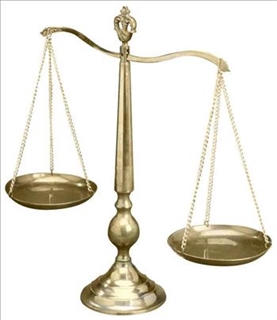
It is interesting that despite the proliferation of legal battles attempting to expunge the God of
the Bible from the public square, a powerful truth still lingers. The reality is that since the
inception of this nation faith has played a great part in forming our laws and our values.
Although secularists try to insist that the founding fathers built a government that was values
neutral when it came to religion; this simply is not the case. To illustrate this point consider
the words expressed by both the legislative and judicial branches of our government prior to the
tragedy of 1962.
Congress in essence summarized all this preceding history when it passed a Joint Resolution
designating 1983 as The Year of the Bible, stating: "Whereas the Bible, the Word of God, has made
a unique contribution in shaping the United States... as a distinctive and blessed nation and
people; ...deeply held religious convictions springing from the Holy scriptures led to the early
settlement of our Nation; ...Biblical teachings inspired concepts of civil government that are
contained in our Declaration of Independence and Constitution of the United States....
Public Law 97-280